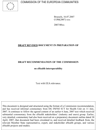 The ICT for Health Unit of Directorate-General Information Society and Media is in the process of drafting a Recommendation which outlines a set of recommended guidelines for good practice on eHealth interoperability. This draft Recommendation is submitted for informal public consultation.
The ICT for Health Unit of Directorate-General Information Society and Media is in the process of drafting a Recommendation which outlines a set of recommended guidelines for good practice on eHealth interoperability. This draft Recommendation is submitted for informal public consultation.
The overarching notion is of a European service space in which, and through which, European citizens and their designated health professionals can access the necessary health services.
The Recommendation is addressed to all the EU Member States, but it also has relevance for the European Economic Area (EEA) countries, and for the appropriate industries and stakeholder associations that work in the eHealth field.
While the Recommendation is considered especially relevant in a cross-border European context, it has, moreover, very obvious benefits for all European citizens and health professionals in the immediate district, local, and/or regional level where they live and work.
The ICT for Health welcomes all feedback on the current draft text, including any comments, suggestions for amendments and additions, criticism and queries. Suggestions on technical aspects in order to facilitate implementation by Member States would also be welcome.
The deadline for feedback for this informal consultation is September 10, 2007.
Download "Draft Recommendation on eHealth Interoperability" Publication (.pdf, 142 KB)
For further information:
ICT for Health
European Commission - Information society and Media DG
Office: BU31 06/73 B-1049 Brussels
Email: This email address is being protected from spambots. You need JavaScript enabled to view it.
Tel: +32 2 296 41 94
Fax: +32 2 296 01 81
http://europa.eu/information_society/eHealth